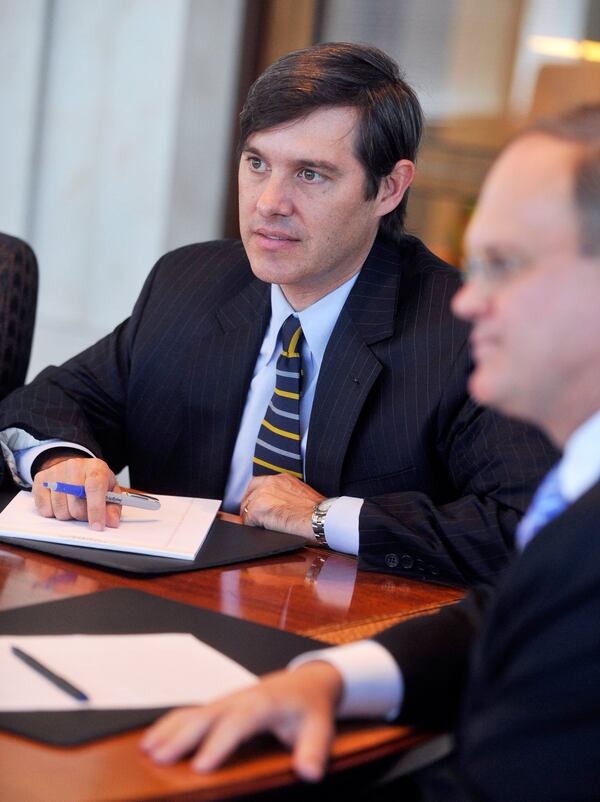When the White House announced last week President Donald Trump's selection of Atlanta attorney Stefan Passantino to be his chief ethics lawyer, the choice was met with nods of appreciation by those who know him.
"You couldn't ask for anybody who is a more sincere or honest person," said attorney Ben Keane, who co-authors Passantino's "Pay to Play" blog, a deep, at-times dense, blog on government campaign finance and regulatory compliance.
Keane said Passantino's new job is a "natural progression" for his colleague, an Emory University Law School graduate who has built a career out of keeping out of ethical trouble Republican politicians and the corporate institutions that fund their campaigns.
As the head of the political law department for megafirm Dentons, Passantino, 50, was counsel for Newt Gingrinch’s 2012 presidential bid and the lawyer for PACs supporting the 2016 campaigns of Rick Perry and Ted Cruz. Passantino’s job has been to keep his clients within the bounds of the law, even if they tiptoed up to the edge.
Few know more about campaign finance law than Passantino, but he is not a regulator or an ethics crusader. In the “Pay to Play” blog, he advocates for the “regulated community” — politicians and the interests who fund their campaigns.
A recent blog post took a dim view of the Security and Exchange Commission's regulation of campaign contributions from firms that managed public pension plans, calling the penalties levied on a particular hedge fund "draconian."
Keane said the blog is speaking to their clients, but also to those who push for more government transparency.
“We want people to follow the law, but we want to be practical as well,” he said.
If Passantino’s resume makes him a logical choice, his personal demeanor is not exactly what we’ve come to expect from the new president and his staff.
Compared to the hard-charging, combative tone set in the early weeks of the Trump administration, Passantino’s reputation is of a strong but reasonable advocate for his clients, inclined more toward the nuances of the law rather than broad interpretation.
“I think he is extremely effective. He knows the law but he knows exactly the right tone to take,” said Decatur attorney Lawton Jordan, who served in the Clinton White House. “He represents his client vigorously without being objectionable.”
Jordan is chairman of the Georgia state ethics commission where he has seen Passantino represent numerous clients on campaign finance issues. Jordan has a very high opinion of him.
“He’s realistic. He doesn’t ask for something that is not going to happen,” he said.
Minefield awaits Passantino
Richard Painter, who served as President George W. Bush’s ethics lawyer, said Passantino is going to need all of his skills to drive the ethical clouds away from the Trump administration.
“He’s going to have to persuade people to do the right thing,” he said. “And he’s going to have to persuade people to be careful and he’s going to have to spot as many issues as he can up front.”
Painter, a University of Minnesota law professor and board vice-chairman of the watchdog group Citizens for Responsibility and Ethics in Washington, is a loud critic of the new president. He also is a plaintiff in a lawsuit filed against Trump citing constitutional questions resulting from the president's many businesses overseas.
Passantino has walked this line before as lawyer for former House Speaker Newt Gingrich, who faced questions about his public and private interests during his 2012 presidential campaign.
Although it was nowhere near the complexity of Trump’s portfolio, Gingrich transferred his businesses to his wife, Callista, during the campaign, drawing criticism and a CREW lawsuit. Passantino defended the arrangement, drawing up rules on how the campaign and the business were to interact.
"That tension is what makes it so important to be meticulous," Passantino told The Washington Post at the time. "We fully expect him to be criticized for this."
Painter said Trump’s decision to transfer management of his holdings to his sons rather than divest them is a challenge for Passantino.
“If he can’t persuade the president to divest his holdings, then he is in a situation of convincing everybody else they have to divest their holdings or recuse from official matters in order to comply with the criminal conflict of interest laws,” he said. “I think it sets a very bad example. It’s going to make it very hard to get other people to comply.”
Painter cites Trump's pick for secretary of commerce, billionaire investor Wilbur Ross, as an example. Painter believes Ross is a fine pick for the position, but he said he should sell off his stake in a trans-oceanic shipping company, Diamond S Shipping, which also counts the Chinese government as an investor.
Failure to divest could require Ross to step aside from important trade discussions, he said.
Job involves prepping nominees
These questions will engage much of Passantino’s time. Painter said about two-thirds of the daily work as White House ethics counsel is prepping presidential nominees for confirmation. There are about 100 nominees a year that must be confirmed, which means compiling financial disclosures and probing possible conflicts of interest for each, he said.
“You have to tell them what they have to sell, you’ve got to make them fill out the financial disclosure form, you have team of lawyers looking at it to make sure it’s right, coordinating with the Office of Government Ethics while they are looking at it and coordinating with the agencies,” he said. “That’s a ton of work.”
There is a limit to what influence Passantino can exert on the administration. When it comes to policy questions, Painter said Trump may not consult Passantino on possible ethical fallout — at least that was his experience with some controversial decisions made while he was in the Bush White House.
"Let's just say that anytime that they got in trouble for what they did, they sure as heck weren't asking me first," he said. "People don't ordinarily ask the White House ethics lawyer before they start firing U.S. attorneys or doing things like that. … They also don't ask the White House ethics lawyer before they generate the torture memos."
Passantino’s decision to join the Trump administration leaves a hole in Atlanta’s legal landscape where his specialized skills were in high demand. A Cobb Country resident, Passantino split time between Dentons’ Atlanta and Washington offices prior to his appointment.
About the Author





